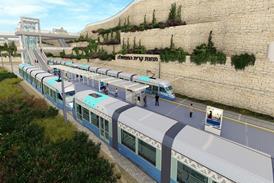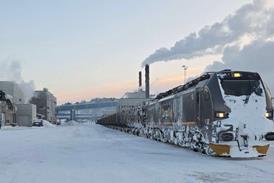WORK IS due to start early this month on the long-planned project to build a 360 km standard gauge line between Méchéria and Béchar in western Algeria. To be laid parallel to Algerian Railways' existing 1055mm gauge alignment, which it will ultimately replace, the line is intended primarily for oil and related traffic.
The project is in the hands of a consortium embracing several Algerian civil engineering companies, TSO of France and SNCF International. Over the next four years, 15 staff from SNCF International will help co-ordinate the programme of work, including earthworks, construction of major structures, and installation of signalling and telecommunications. They will also design maintenance workshops and depots for the motive power and wagon fleets.
As the line passes through the Atlas mountains, a number of major bridges and viaducts will need to be built, for example between between Aãn Sefra and Beni Ounif near the border with Morocco.
SNCF International has also undertaken to provide the interface with SNTF to ensure that freight trains can continue to operate on the existing narrow gauge line while work is in progress.
In eastern Algeria work is finally nearing completion on the new line from Aãn Touta to M'Sila, and SNTF's target is to open to commercial traffic next year. This 150 km single-track route has been under construction for many years, and a major milestone was reached at the end of March with the completion of all civil engineering work. Over 95% of the formation has been laid, and tracklaying has passed the 65% mark.
Intended primarily for freight traffic, the line is to be extended later north from M'Sila to Bordj Bou Arreridj on the main line from Alger to Constantine.
Electrification contracts
SNTF has long-term proposals to electrify at least half the 3974 route-km standard gauge network, starting with the suburban routes serving the capital (RG 3.04 p123). A contract worth €88m is being negotiated by an Alstom-led consortium to electrify at 25 kV the line running east from Alger to Thénia, the route running west from El Harrach to El Afroun, and the route from Oued Smar to Gué de Constantine, in all, about 300 track-km.
Alstom's contract is shared with SNTF civil engineering subsidiary Infrarail and local company Baticim, which will supply masts and other steelwork. The project is intended to bring a major increase in capacity, thanks to use of electric multiple-units with faster acceleration than the present diesel fleet and more frequent services.
Each train will be able to accommodate 1800 passengers, and SNTF expects to see traffic increase from 20 million passengers a year now to 60 million a year in 2010. Tenders for a contract to supervise the electrification work were due to close on May 20.
In the longer term, SNTF would also like to electrify the suburban routes serving Constantine and Oran. More immediately, it is planning to renovate its only existing electrified route between the iron ore mines at Djebel Onk, Tébessa and Annaba. The steeply-graded 230 km line is wired at 3 kV DC, and tenders for rehabilitation of the equipment between Bouchegouf and Annaba closed in February.

















